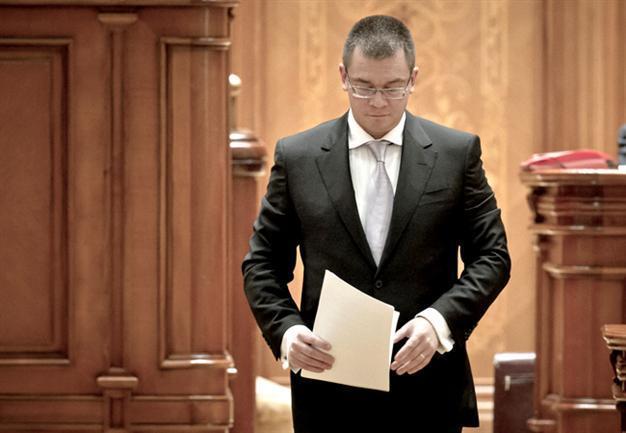Romanian government falls in no-confidence vote
BUCHAREST - The Associated Press

Romanian Prime Minister Mihai Razvan Ungureanu prepares to deliver a speech during a special parliament session in Bucharest. AP photo
Romania's government fell today in a no-confidence vote, as opposition parties seized on widespread public anger over biting austerity measures, cronyism and corruption.
Some 235 lawmakers voted against the government of Prime Minister Mihai Razvan Ungureanu, four more votes than needed.
Opposition leader Victor Ponta said the vote represented the end "of an abusive system that uses any weapon possible." "Sometimes there is justice. Today there was justice," he declared.
President Traian Basescu will nominate a new prime minister who will then need to present a governing program to Parliament for approval.
The Czech government also faces a vote of no confidence Friday, which it is expected to survive amid growing public anger against austerity measures and corruption.
Former Romanian Prime Minister Emil Boc, whose four-year-old government was toppled in February after weeks of often violent protests over austerity measures, called the vote "a victory for opportunism in
politics and party swapping." However, he added "I take responsibility for this failure." Romania's national currency, the leu, fell close to an all-time low on the news. Basescu was scheduled to meet Romania's political parties later for consultations at the Cotroceni presidential palace about a new government.
Thousands have protested in both Romania and the Czech Republic in recent months calling for their governments to abandon the belt-tightening measures and resign, in some of the biggest rallies seen since the overthrow of communism in 1989.
Boc called on the Romanian opposition to "immediately" take on the responsibility of governing the country to avoid political and economic instability.
"Any moment of instability means Romanians losing money from their pockets," he said after meeting Basescu. Opposition parties met the president for brief talks and proposed Ponta as their candidate for prime minister. Basescu is due to nominate a prime minister-designate later Friday.
In Prague, Prime Minister Petr Necas vowed to continue with reforms and cuts if the government survives the Czech vote of no confidence.
"We have to take the steps today. If we postpone them, we will have to adopt them anyway but they will be much more painful," he told lawmakers.
Bohuslav Sobotka, chairman of the major opposition Social Democrats, said it was not normal for the government "to exist when it ignores the mass protests of citizens in the streets." 100,000 people rallied in Prague on Saturday, calling on the government to scrap the cuts and leave office. The following day, leaders of the three parties in the center-right government dissolved their coalition. The split was triggered when Vit Barta, a prominent member of the centrist Public Affairs party which ran on an anti-corruption ticket in 2010, refused to resign after being convicted of paying bribes.
Czechs are angry about a sales tax hike and an extra 7 percent income tax slapped on high earners. The government has also revised earlier promises to increase pensions and introduced a new entrance fee for university students. Unions say health and pension reforms will hurt ordinary people the most. The Social Democrats have surged in opinion polls.
In Bucharest, the government hiked the sales tax to 24 percent and slashed public sector wages by one-fourth to meet the conditions of a 20 billion euro bailout it took from the International Monetary Fund, the European Union and the World Bank in 2009.
"We don't want any more dubious firms, no more selling under the market price and huge bribes as we have now," said Ponta, leader of Romania's opposition Social Democracy Party.
